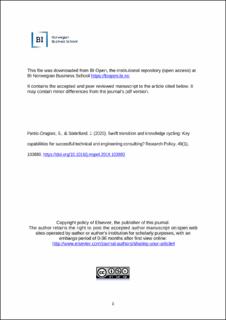| dc.contributor.author | Pantic Dragisic, Svjetlana | |
| dc.contributor.author | Söderlund, Jonas | |
| dc.date.accessioned | 2020-11-20T18:02:20Z | |
| dc.date.available | 2020-11-20T18:02:20Z | |
| dc.date.created | 2020-01-24T16:51:36Z | |
| dc.date.issued | 2019 | |
| dc.identifier.citation | Research Policy. 2020, 49(1). | en_US |
| dc.identifier.issn | 0048-7333 | |
| dc.identifier.uri | https://hdl.handle.net/11250/2688952 | |
| dc.description.abstract | The organization of innovation labor is undergoing major changes in technology-based and engineering-intensive industries worldwide. Those changes reflect fluctuating market demands and increasing task uncertainty, and they are characterized by three related developments: externalization of the workforce, development of new types of employment relations, and greater use of technical consultants. These trends have led to the technical and engineering consulting (TEC) industry becoming a major player in the organization of innovation labor and thus also in the development and transfer of engineering knowledge. Determining what underlies the growth of this industry and the performance of TEC firms requires a better understanding of their nature and capabilities. Our paper builds on an in-depth case study—spanning multiple organizational levels and incorporating 50 interviews with a leading Scandinavian TEC firm's top managers, middle managers, consultant managers, individual consultants, and clients as well as field observations and diary studies. These data lead us to posit two central capabilities associated with innovation labor in technical and engineering consulting: swift transition and knowledge cycling. The interplay between these capabilities, each of which arises from interactions between the firm level and the individual level, seems crucial for the successful development, organization, and supply of innovation labor and engineering knowledge. | en_US |
| dc.language.iso | eng | en_US |
| dc.publisher | Elsevier | en_US |
| dc.rights | Attribution-NonCommercial-NoDerivatives 4.0 Internasjonal | * |
| dc.rights.uri | http://creativecommons.org/licenses/by-nc-nd/4.0/deed.no | * |
| dc.title | Swift transition and knowledge cycling | en_US |
| dc.type | Journal article | en_US |
| dc.type | Peer reviewed | en_US |
| dc.description.version | acceptedVersion | en_US |
| dc.source.volume | 49 | en_US |
| dc.source.journal | Research Policy | en_US |
| dc.source.issue | 1 | en_US |
| dc.identifier.doi | 10.1016/j.respol.2019.103880 | |
| dc.identifier.cristin | 1781830 | |
| cristin.unitcode | 158,4,0,0 | |
| cristin.unitname | Institutt for ledelse og organisasjon | |
| cristin.ispublished | true | |
| cristin.fulltext | postprint | |
| cristin.qualitycode | 2 | |

